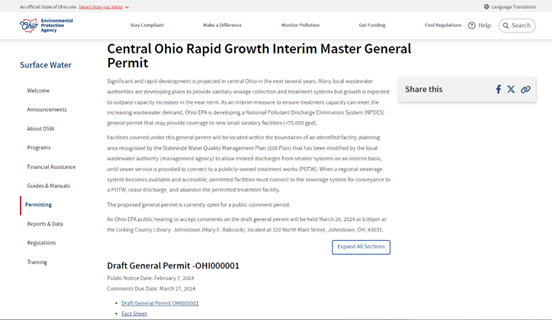The Ohio Environmental Protection Agency heard the message loud and clear.
It has withdrawn a controversial proposal to allow small, privately operated sewage-treatment plants to aid rapid development in rural Delaware and Licking counties, which had raised concerns among local officials about potential pollution of waterways.
“Ohio EPA has canceled the public meeting scheduled for March 20, 2024, at the Licking County Library,” the EPA said in a brief statement in a news release dated Thursday and posted on its website. “Based on comments and stakeholder feedback from municipalities, county sewer districts, and residents, Ohio EPA is choosing to withdraw the draft permit.”

By Friday afternoon, a notice of the proposal and public meeting had been removed from the EPA’s website. The EPA said in its news release that it will “will continue to work with local stakeholders on alternative ways to manage the issue.”
One of those ways is by updating a water-quality management plan for Licking and Delaware counties, according to an EPA statement Friday. The plan outlines service areas for municipal and county sewage-treatment utilities.
Withdrawal of the proposal was welcome news to local officials who weren’t waiting for the public meeting that had been scheduled for March 20 at the Mary E. Babcock Library in Johnstown to share their thoughts, which ranged from concerns about water pollution and human health to the “terrifying” long-term implications of unplanned growth and environmental degradation.
Licking County Commissioner Tim Bubb said Friday he wasn’t surprised that the EPA withdrew the proposal.
“It was a flawed approach that was overreactive,” he said. “It was almost a Hail-Mary thing that was done without thinking about the long-term implications.”
Bubb said he was pleased that the EPA listened to the “many thoughtful responses from local officials,” and he hopes EPA officials take a step back and “that they are thoughtful going forward.”
The EPA statement said the agency’s intention with the proposal was “to manage anticipated growth in central Ohio in areas where local publicly owned wastewater treatment infrastructure was not available.”
Licking County officials said previously that state officials told them the proposal to allow small, privately operated wastewater treatment facilities was driven by the need for housing for construction workers and employees of Intel and related companies coming to the New Albany International Business Park in western Licking County. Intel is building what it says will be the largest computer-chip manufacturing complex in the world – a $20 billion factory covering nearly 1,000 acres of former farmland in New Albany, just south of Johnstown.
The EPA said in its proposal that it was considering fast-tracking small treatment plants, which are sometimes called “package plants,” as an interim measure “to ensure treatment capacity can meet the increasing wastewater demand.”
The proposal would have allowed developers to build the small sewage-treatment plants and turn them over to homeowners associations to operate them until water and sewer lines are extended to the development. Kristy Hawthorne, program administrator for Licking County Soil and Water Conservation District, said it was a recipe for failure, given the shortage of treatment-plant operators and because homeowners’ associations know nothing about operating such facilities.
Ohio EPA Director Anne M. Vogel was roundly criticized by Licking County residents on social media for saying in an introduction to the proposal that she “determined that a lowering of water quality in water of the state in central Ohio is necessary.”
That did not sit well with people who depend on that resource for drinking water.
The small treatment plants could each handle up to 75,000 gallons of sewage a day, which Licking County authorities say could accommodate subdivisions of up to 60 houses or a hotel-restaurant complex.
The Licking County commissioners and the Licking County Health Department sent letters to the EPA during the past two weeks expressing concerns about unplanned growth, pollution and taxpayer expenses to clean up the mess when small wastewater-treatment plants fail, saying the facilities would increase the likelihood of untreated wastewater being discharged to waterways across Licking County.
Chad Brown, Licking County Health Commissioner, said Friday he is pleased with the EPA’s decision.
“That’s good news,” he said. “Obviously, with the letter we sent, that’s a positive development.”
Brown said the Health Department is not against development, and it is “willing to work with the EPA and anyone” to see that it is done in a thoughtful way that does not endanger public health.
The county commissioners’ letter to the EPA, signed by Bubb and commissioners Duane Flowers and Rick Black, said the EPA’s proposal was “woefully insufficient to address long-term maintenance of these facilities. It is simply unrealistic to expect developers or homeowners’ associations to be accountable for long-term maintenance of these facilities, which, of course, means taxpayers will ultimately have to foot the bill.”
The commissioners also said the proposal did not grant sufficient local regulatory control or enforcement authority – or funding for either – to assure that the facilities would be properly monitored and inspected to assure they are operated properly.
Bubb and Brown said a better path forward would be to expand the capacity of existing publicly owned wastewater-treatment plants and to build more of them.
Hawthorne said her agency is happy to hear that the EPA is listening to the communities the proposal would have affected.
“We are not anti-development,” she said. “We are pro-proper development. Our environment should not be degraded in order to appease developers who do not have ties to our communities or our natural resources.”
Alan Miller writes for TheReportingProject.org, the nonprofit news organization of Denison University’s Journalism program, which is funded by the Mellon Foundation and donations from readers.

